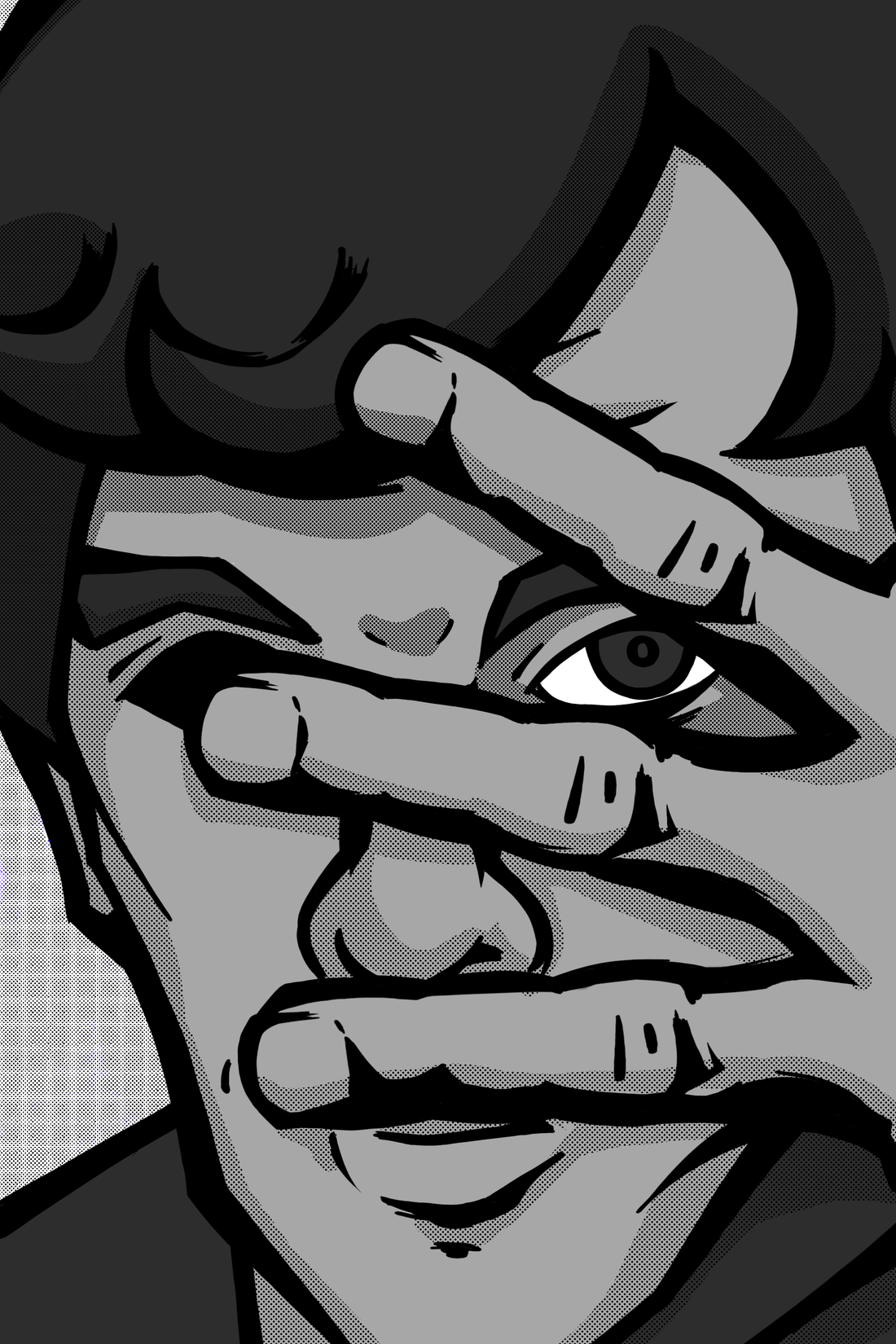We sat down with author and founder of Underink Press, David McNeill, to discuss the publication's inaugral book. His new book is part personal essay, part academic work: Give Up After Three: A historical analysis of Sherlock's lost final episode.

The first of three books McNeill has coming out this year through Underink, Give Up After Three is described on the dust jacket as being "about a lot of things, but mostly it's about the radicalised community that grew up around BBC's Sherlock."
Q: Okay, let's start with the obvious, why write a book about Sherlock?
Alright you be every person I pitch it to?
Q: Hah, sure.
You remember BBC's Sherlock? With Beneditch Cumberbatch and the guy from The Office?
Q: The one with Martin Freeman?
Yeah exactly. Well, basically this bizarre thing happened with the show that I haven't stopped thinking about since, well, ever. A bunch of fans online were so sure the show was good, despite it being a bit crap, they invented this conspiracy that the showrunners had a secret "final" episode they were going to release that would explain away all the plot mistakes and validate a queer relationship between Sherlock and John.
The whole thing was a bit of a farse, but as anyone who has followed me for more than five minutes will realise I have a bit of an obession with one of the co-creators, Steven Moffat.
So anyway, I'm chatting to a Star Wars buddy of mine, Darth, and we realise there's a lot of overlap in behaviour between the audiences of Sherlock historically, and the fans who interact with his Youtube content about Star Wars.
Naturally, we decided to record a year long show delving into each episode of Sherlock in release order while I read the historical blogs and content from users at the time. The notes and research from that show became the book. Was kind of always my plan.
Q: Certainly a unique way to come upon a manuscript. Is there anything from that process that really influenced the book?
You know, surprisingly, I think the biggest thing was empathy for the historical readers. They had all these goofy and bizarre fan theories and fan fiction, but doing the show and reading it along with Darth you just get the sense that these viewers want to see themselves represented.
A bunch of teenagers growing into themselves and realising their sexuality and preferences, and finding comradery in online spaces with each other.
They might've lived in places where it's not okay to be out, or even just where no one they know has similar interest. Sherlock fan spaces became communities for self-expression and growth. You know it was okay to want Sherlock to kiss John. Was encouraged. So yeah, I think the show helped me find the humanity in the analysis.
Q: On the podcast with Darth you've expressed a.. mild distaste for Sherlock. Can you express your thoughts on why you've invested so much time and creativity in a show that just doesn't do it for you?
My friend Pat described is well in a discussion we were having about Moneyball of all films, one of my top five all timers. He pointed out that I'm more interested in the abstract meaning or larger picture than I am compelled by the subject.
I care a metric ton about the original Sherlock Holmes stories, I've read them multiple times. They've informed my novels. Hell, book two [Maynard Trigg and The City of Whispers] is a murder mystery and is about "Detecting" as it's called in the story. It's a low tech version of Cumberbatch's wooshy wooshy VFX stuff.
But the show itself is like any subject for me. It's challenging and not something I'd watch in my down time, and that's part of why it was such a pleasure to work through the project. This opportunity to create something of value and substance from something I'd normally walk past.
I recognised there's something about the show that is the perfect gateway for media literacy. It's equal parts flippant and too self-serious. It felt... right as a subject.
Q: Pivoting a little, I noticed how contemporary feeling some of the posts are you include in the book. They feel like they belong under a news article on a gossip site reporting on the next season of an HBO show or some celebrity news. Despite being from 2012 they feel current? Is that something you're conscious of, how the whole fandom conspiracy theory fits fairly easily onto media cycles today?
These issues are timeless. It's a challenege of audience scale and media literacy, ultimately.
We were doing a live stream the other week, right? Literally a week ago. Talking about Star Wars stuff. And this person joins the chat and asks us to read their theory about the season finale of the show [The Mandalorian] we're talking about.
And they were saying things like "oh well it's on the top of the Star Wars" reddit and "it's gone viral, so many people think I'm right" and we're sitting there, doing our thing. We're wrapping up the show and decide to read the theory, talk about it.
It has all the same hallmarks of these Sherlock Tumblr fans. These theories that just fundamentally misunderstand how stories work and how TV gets made.
Plus all the classic radicalisation rhetoric like the imagined public, you know "if they do X the fans will..." and so on. And I sat there on the stream and basically worked through dismantling it with the same tools that I'd developed in the manuscript.
It was spooky timing, I guess but oddly validating that yes, it's more relevant than ever.
Q: Maybe it's inevitable with big media properties that have history to them. On that note, you follow a few Tumblr users throughout the book - inevitably-johnlocked and loudest-subtext-in-television, and throughout a lot of the example posts they maintain a tone of voice. Even certain phrases like "do you really think that" get repeated a lot which you call attention to. Is that sort of what you mean by hallmarks?
For sure. It varies franchise to franchise - there's that gross word again - maybe let's say it varies story to story and community to community instead.
But there's some stuff writ-large that gets wielded in these kind of thoughtless blunt implementations. It's like any time someone calls something woke or implies that wokesness is an issue with a franchise or text, saying it's "pandering" or whatever.
Even if wokeness existed, they're point ultimately is that a company thought including better diversity would make a better story or make them more sales.
Which isn't that free market economics at work? Isn't that what conversatives want? When I say hallmarks I mean that it's similar rhetoric. Similar moves. Comeplled by different motivations.
Shit, I've said it for years but it's the "I don't want politics in my stories" people who actually mean "this story has politics I disagree with" it's all the same rhetorical move. Fundamentally contradictory arguments that rely on all kinds of denial of reality.
Q: It does your head in after a while.
Which is the fun of the book, really. I get to take these big, amorphous concepts and trace them through individual users alongside the show as it plays out.
These communities normalise these opinions or rhetorical stances, however you think of them, and after a while it's like they don't hear themselves. You know these kids are analysing the importance of a candle on the set that isn't lit then connecting it to Barthes and cultural coding.
Some of it so absurd it wraps around to being endearing.
Q: Actually I wanted to ask you about that. At some point later in the book you call on how these fans approach Sherlock with similar kind of tools as radicalised folks like Flat Earthers and QAnon believers. The connection seems obvious when you lay it out in the book. You've already mentioned this on The Advisory, but I'm curious where the biggest changes are in the process of putting this book together versus the Maynard Trigg series?
Obviously the research is a huge part of it. I think I read upwards of thirty papers and more Tumblr than is probably safe for any one person.
Actually yeah that's definitely the biggest difference.
Writing fiction is very iterative with the writing then research then the editing. You chunk it into phases. "Oh this month I'm doing the structural edit" and then "cool it's time for the scene work and pacing" but the research for that is reading other fiction and looking up structures or like craft things. It's kind of utility based? I was stuck on this scene in the third Maynard Trigg book a few weeks ago and I studied a handful of chapters and TV show clips to find what I was trying to do. It's so different to the Sherlock book.
The whole time it's sitting down and going "hm, I make this claim here" and going to find support and challenges to the claim. It's a lot closer to a researched debate with yourself.
That's not an answer is it?
Q: Let me rephrase a little. You've made a name talking about stories, fair to say?
Sure.
Q: This book is a story of two people talking about stories. Are you comfortable talking about the conceptual hook?
I think it's already in the marketing somewhere so yeah absolutely.
The concept is something I came on very very early in the process. I'd read hours and hours of these Tumblr posts. Knew we were going to do the podcast and then I'd write the book. I wanted to find a way to show my appreciation for these fans and their approach to the show, so I sort of worked in this conceit I guess you'd call it.
In the book I visit Sherlock at Baker Street, and we talk through his stories, and that's what you're reading. Our discussion and synthesis. I even get to sort of pitch my own conclusion to his story.
It's fun and hopefully both proves the work of the research and shows my respect for the Tumblr users I'm referencing.
Q: On the note of fan fiction, you're somewhat known for your entry into publishing through your failed fan ficton Pokemon stories. Was that part of the motivation to write this book and tell the story of these fans?
I thought I'd get away without bringing it up, haha.
Absolutely.
It's funny, the older I get the more I love that it's part of my journey. I've been ashamed of those stories for a long time, but since I made that video in response to... was that my ex sub tweeting me? It was, right?
Q: I think so. She mentioned finding an old draft cleaning out her apartment.
That's right. Yeah, I've just started owning it.
In fact, we're launching a show soon on Black Swan Society to re-read and dissect those Pokemon books to pull out the valuable lessons and mistakes of being a young writer.
And that's kind of this Sherlock book, really.
It's the story of how a gang of nerdy, toxic teenagers has to face the music as it were. How these theories work under daylight. Where the rats run to, how they got tricked so bad, and what it means when everything falls apart.
Hopefully, it's a book you walk away from with hope for these folks.
I believe in them. Kind of the internet's shelf of misfit toys going on to lead big, fantastic lives where yeah, maybe Sherlock and John snog. What's so wrong with that?
While you wait, check out the Maynard Trigg series on sale now.

